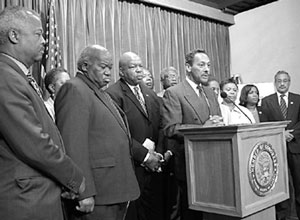
WASHINGTON (FinalCall.com) – Despite their initial split-opposition to the war in Iraq, the Congressional Black Caucus (CBC) now stands united in opposition to Pres. George W. Bush’s “blank check” request for $87 billion more for the war campaign as they seek to reestablish their voice as a moral authority in the U.S. government.
“The Congressional Black Caucus is proving itself once again to be the conscience of this Congress,” Rep. Melvin Watt (D-N.C.), CBC task force leader on the issue, told reporters at the Capitol Sept. 17. The CBC has held a series of meetings in order to define for themselves and articulate for the rest of the country the principles they will use in evaluating Mr. Bush’s request.
The CBC “principles” regarding the new supplemental request call for the Bush administration to provide an accounting of all the funds already appropriated by Congress that have been expended to date, including details about all contracts for work in Iraq, along with details about how the proposed funding will be spent.
“There are some standards, common sense standards, that we did articulate before the original vote that ceded to the President the authority to make the decision to go to this war in the first place,” Mr. Watt continued. “Had those original principles been followed by this administration, I don’t think that we would be here in the posture that we are in today, without world support, without a clear vision of what we’re trying to do.”
The CBC has stood firm in raising pertinent questions throughout the war process. This latest gambit is not just a rhetorical exercise or a political game, Mr. Watt emphasized.
Last March, on the eve of the war, the CBC said in a statement that it “oppose(s) a unilateral first-strike action by the United States without a clearly demonstrated and imminent threat of attack on the United States.” They also insisted that only Congress has the authority to declare war, and called for all diplomatic options to be exhausted before the military campaign.
Even before that, they articulated guidelines for their support of the war, which still have not been met. Last October, “the Bush administration had not presented us with the evidence that we needed–both constitutionally and morally–to support its plans,” CBC Chair Elijah Cummings (D-Md.), said at the press conference.
“It has not done so, I must note, to this day. Last year’s concerns have now become this year’s harsh realities–realities that we must face as a nation and overcome.”
Today, CBC members want separate evaluation for the funding proposed for the protection and maintenance of U.S. troops, and other funds proposed for the rebuilding of Iraq, because they do not want their questions to be characterized by administration supporters as constituting disloyalty or lack of support for U.S. military personnel already deployed.
Now, with critics of the war calling it a “quagmire,” and Mr. Bush’s popularity plummeting as the numbers of casualties as well as the projected costs continue to rise, CBC members are beginning to feel vindicated.
CBC members are increasingly joined by others in Congress, including Republicans who are now raising questions about the additional request, particularly in light of multi-billion dollar “no-bid” contracts being awarded to companies like Halliburton and Bechtel, both of which have ties to senior administration officials.
Lawmakers in both parties seem to be increasingly uncomfortable with the size of the new spending request, in light of the overall 2004 budget’s projected deficit of more than $480 billion.
Many Democrats, including supporters of the war resolution last fall, have cited the worsening deficit in their calls for the suspension or repeal of the nearly $2 billion in tax cuts Mr. Bush successfully campaigned for last year.
CBC member Harold Ford (D-Tenn.), is one of those Democrats. “I supported the resolution that came before the Congress, unlike many of my colleagues here, regarding using force in Iraq,” said Mr. Ford. “My concern, at this moment, is similar to my colleagues now. Many of the facts were misrepresented and many of the assertions were misrepresented on the part of this administration.
“I challenge the President that he will not have my vote, unless they’re willing to make changes in their tax policy. I cannot in good faith support–as much as I believe in (the war)–but I cannot in good faith support cuts to education and healthcare, when we won’t say to millionaires in this country–and I’m blessed to have a few in my family–that you’re not going to receive your share in the future, until we get this economic train back on track,” Mr. Ford continued.
One veteran pointed out that it is the Bush administration that has short-changed U.S. fighting forces all along. “I maintain that the support that this administration is giving to troops is in fact, qualified and questionable,” said Rep. James Clyburn (D-S.C.). “We have been clamoring for weeks, yes months, asking this administration to support funds for those who find themselves in imminent danger in Afghanistan and Iraq, which they lose Sept. 30.”
he said. Many reservists especially, are standing in danger of losing their Family Separation Allowances and Imminent Danger Pay. Those personnel thought they were going to be gone for six-month deployments in the war zones. Now, they’ve learned they may be gone for 12-18 months and stand to lose that extra pay, he said.
In addition, disabled veterans face an unusual form of discrimination, he complained. Military personnel who retire after 20 years service with a service-related disability–a lost arm or leg, or other injury–will now have their disability pay deducted from their retirement benefits, while retirees with no disabilities will get full retirement. “He or she will be less able to find another job, to supplement retirement pay. That is criminal!” Mr. Clyburn said. “We ought not be approving this $87 billion unless this administration comes up with part of this money to get rid of this unfair tax on disabled American veterans.”












